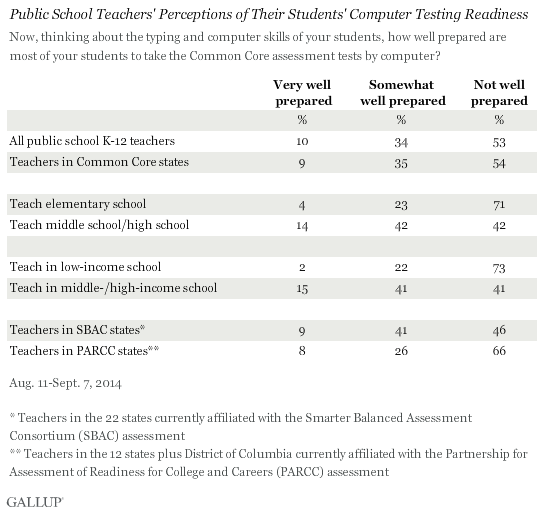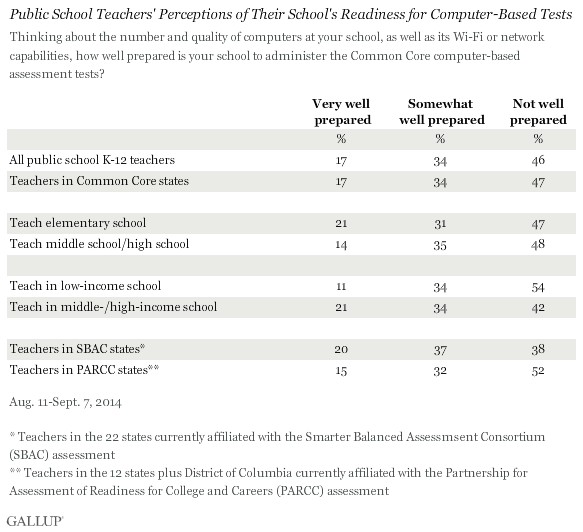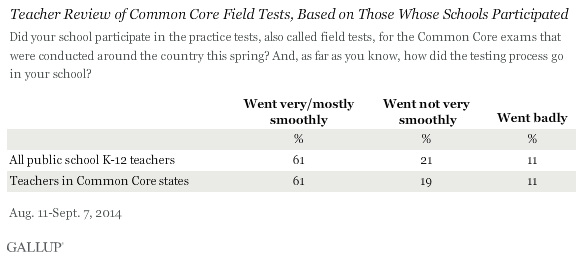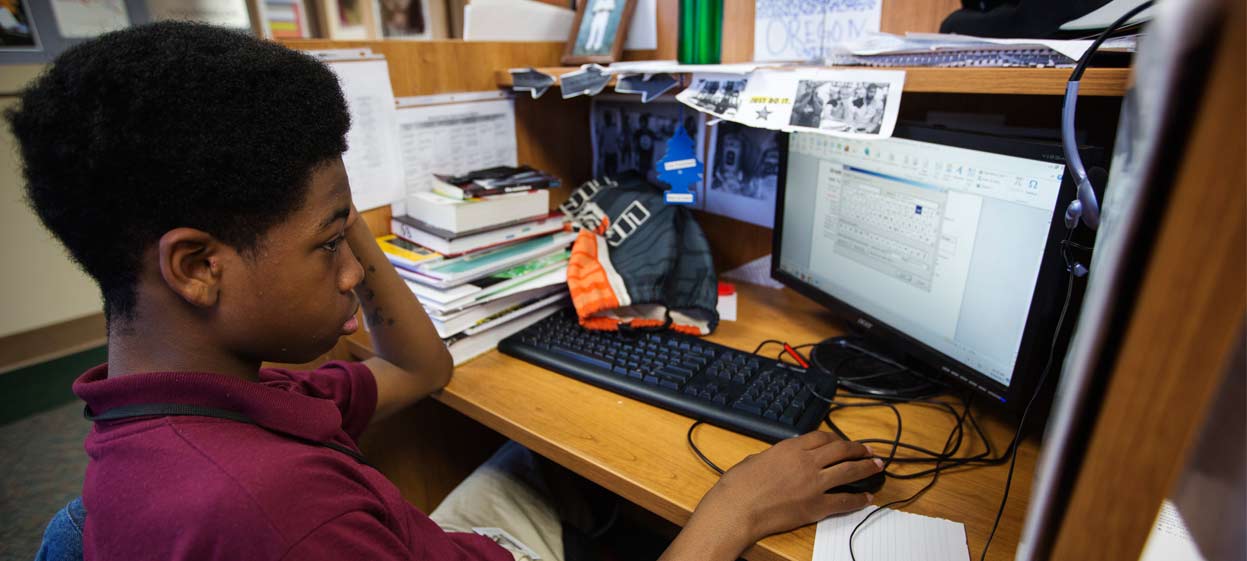Story Highlights
- About half say students not prepared for computer testing
- Teachers in low-income schools are the most uneasy
- Six in 10 familiar with practice tests say they went well
PRINCETON, N.J. -- After overseeing the introduction of the Common Core curriculum standards in their schools for at least a year, most states must now start assessing student learning in English and math with new standardized online tests. Yet the majority of U.S. public school teachers whom Gallup surveyed believe their own students are not well prepared for these computer-based assessments, given their typing and computer skills.

Considering their students' typing and computer skills, 54% of teachers working in states where the Common Core State Standards are being used say their students are not well prepared to take the Common Core assessment tests by computer.
The issue is particularly concerning for elementary school teachers, as well as teachers who say they work in schools where most of the students are from low-income families. Roughly seven in 10 teachers in both of these categories say their students are not well prepared for the tests from the standpoint of their keyboarding or computer skills. This contrasts with about four in 10 teachers of higher grade levels, or of students mainly from middle- or high-income backgrounds.
In responding to an open-ended survey question, an elementary school teacher working in a rural district in Washington state commented: "Computer-based testing will punish lower-income students without regular access to computers -- now we have to teach the content AND the computer?"
These findings are based on a Gallup Panel survey conducted via the Web with 854 public school teachers in grades K-12 across the country. Teachers in the Gallup Panel are selected at random from Gallup Daily tracking to become panelists. Teachers available to take surveys by Web (95% of teacher panelists) were invited to take the Common Core survey online between Aug. 11 and Sept. 7.
Nearly Half Indicate School Technology Isn't Adequate
Teachers in Common Core states are only slightly less concerned about their school's technical preparedness to administer the Common Core tests than they are about their students' readiness. Close to half, 47%, say their school is not well prepared to administer the online assessment tests, given its computer hardware or networking abilities. A third say their school is somewhat well prepared to do this, while 17% say it is very well prepared.
These views are similar among teachers at the elementary vs. middle and high school levels; however, teachers in schools where the students are mostly low income are a bit more likely to report lack of preparedness than those in schools with more well-to-do populations, 54% vs. 42%.

The two major state confederations assembled to create Common Core-aligned tests are working to provide districts with clear guidelines for the technology requirements needed to administer the exams in a reasonable time. However, from the data, it appears that the Partnership for Assessment of Readiness for College and Careers (PARCC) states may have a more difficult task than those aligned with the Smarter Balanced Assessment Consortium (SBAC), as teachers in the states affiliated with PARCC are much less likely than those in the SBAC states to believe their schools are technologically prepared.
Six in 10 Teachers Report That Field Testing Went Smoothly
Forty-eight percent of teachers nationally, including 49% of those in Common Core states, report that their school participated in the field tests held last spring for both exams. And when asked how this practice testing went, the majority nationwide say it went very smoothly (10%) or mostly smoothly (51%), while 21% say it did not go smoothly and 11% say it went badly.

These findings are important, because the testing consortia themselves have not reported any nationally representative data on how the field testing went in all of the states they work with. The Gallup data on perceptions from teachers at least provide a rough confirmation that the experience has been positive overall, but with a sizable minority reporting problems.
Bottom Line
From their vantage point on education's front lines, U.S. public school teachers see the potential for problems with the computer testing of students that has become integral to the Common Core program. The majority of teachers in Common Core states indicate that the students they work with lack the level of typing and computer skills needed to perform well on the tests. And nearly half say their school is ill-prepared when it comes to the computer hardware or network capabilities needed to administer them.
The testing consortia are clearly aware of these problems. According to the report on its spring 2014 field test, SBAC documented a variety of computer-related problems that schools encountered, including lost Internet access during testing, test sessions timing out during extended pauses in student input, problems with logging in or resetting passwords, and complaints about the keyboarding challenges some students experienced during extended writing-based tasks. PARCC's review of its testing describes some student confusion over how to submit answers and difficulties in using the interactive tools, as well as breakoffs that required some students to start over.
Despite these sorts of issues, the solid majority of teachers in Gallup's survey who experienced firsthand the field testing last spring report that it went at least fairly smoothly. Nevertheless, a third had more negative experiences with the test, possibly intensifying their broader concerns about the testing component of Common Core -- which the majority of teachers don't like -- and these may be contributing to teachers' so-so review of Common Core overall.
Survey Methods
Results are based on Web interviews conducted Aug. 11-Sept. 7, 2014, via the Gallup Panel, with a random sample of 854 public K-12 school teachers, aged 18 and older, with Internet access, living in all 50 U.S. states and the District of Columbia. The data are weighted to match national teacher demographics of gender, age, race, Hispanic ethnicity, education and region. Demographic weighting targets are based on the weighted demographic distribution of Gallup's nationally representative nightly poll respondents identified as teachers over a period of four years.
For results based on the sample of 854 public school teachers, the margin of sampling error is ±5 percentage points.
Gallup Panel members are selected using probability-based methods including random-digit-dial (RDD) methods for selection of landline and cellphone numbers, and address-based-sampling (ABS).
Learn more about how the Gallup Panel works.

